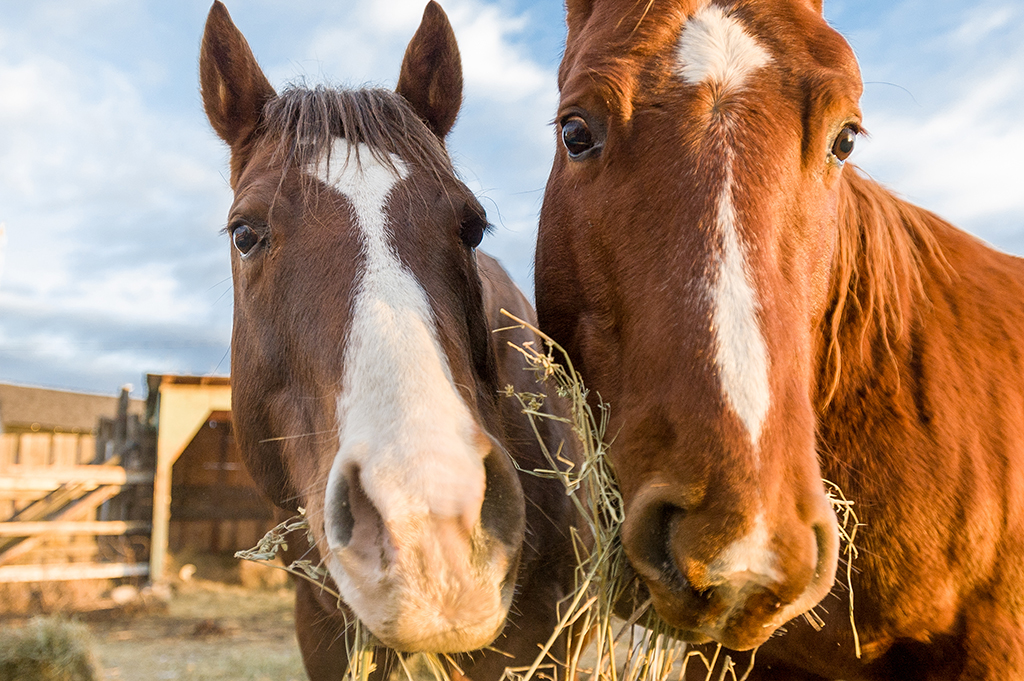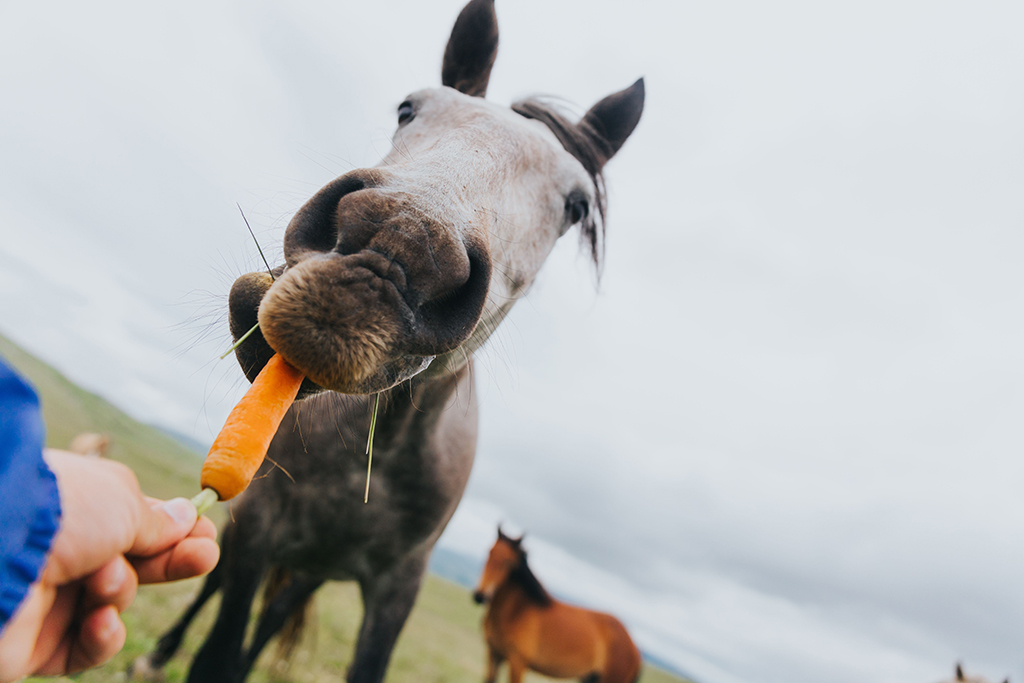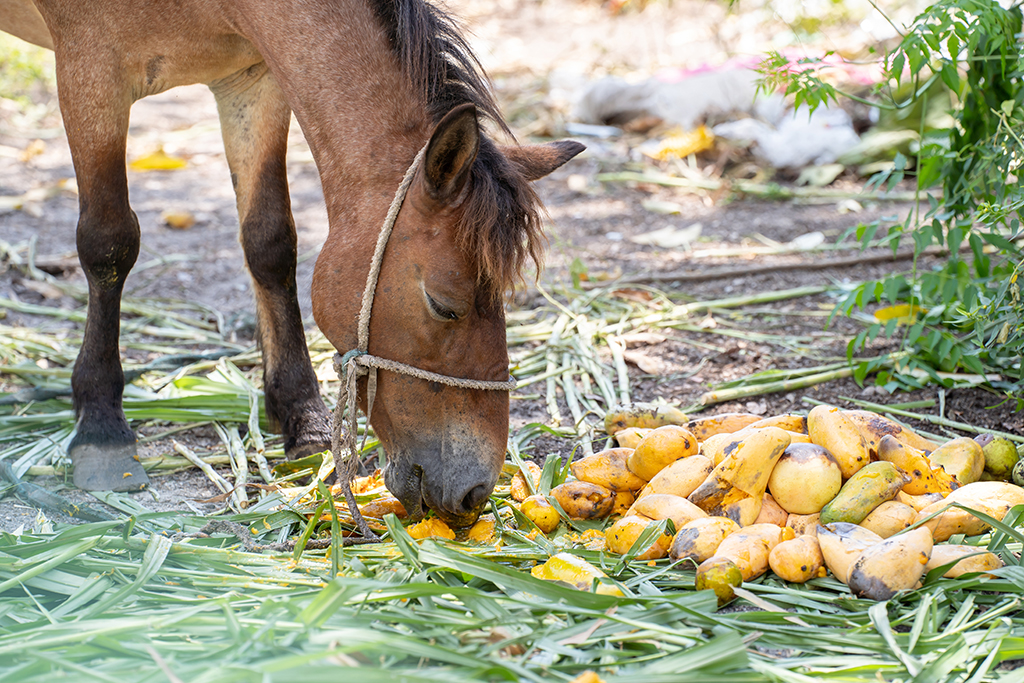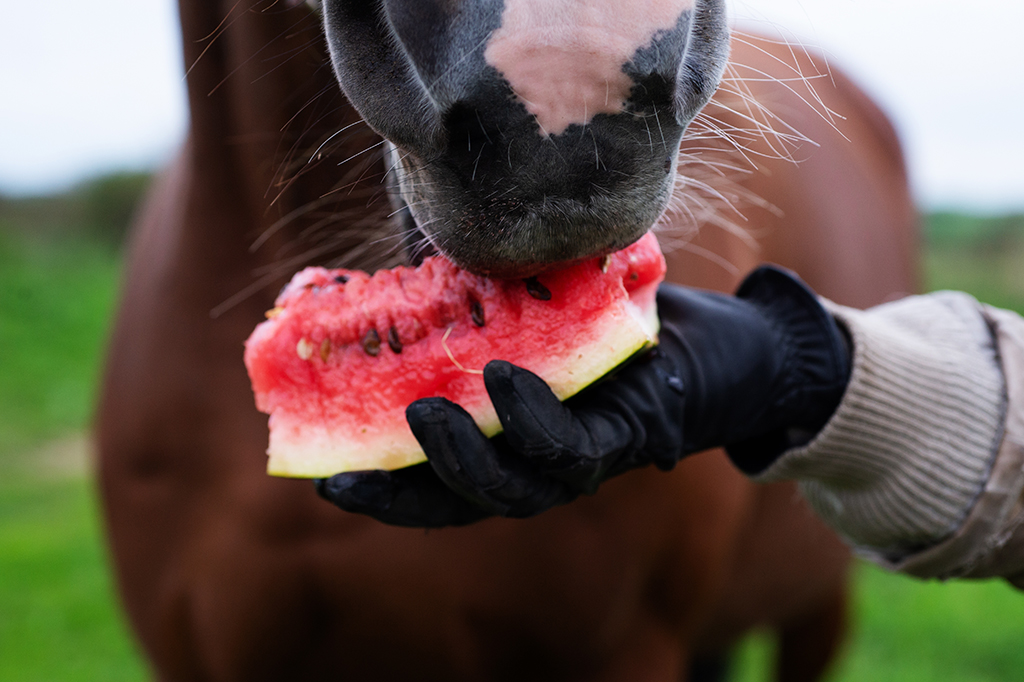
We love our horses; there are currently 847,000 horses in the UK alone, and we love making them happy and giving them treats. But despite the well-known saying ‘eat like a horse’, you can’t just give a horse anything to eat, apart from the fact that they’re herbivores, they have a very complicated digestive system.
So what can we feed them? And how do we make sure we’re keeping them healthy? We’ve had a look at the foods that horses can and can’t eat so you don’t have to. Let’s take a look.
A HORSE’S DIGESTIVE SYSTEM
Horses are slow-grazing feeders; this means their digestive system can only handle small amounts passing through at any one time. They’re used to eating a high-fibre, low-starch diet and their stomachs can’t hold large quantities of food; if they have a large meal it could lead to diarrhoea and colic.
Domestic horses have different lifestyles now, compared to their ancestors, and they’re no longer grazing and roaming 24/7, their feed also contains more starch that is harder for them to digest.
WHAT DO HORSES EAT?
Horses need lots of fibre, and they need to eat little and often, pretty much grazing all day. Here’s what they eat:
- Grass – this is their natural food and they love it, but while it’s good for their digestive system, eating too much of it in the spring can increase their chances of laminitis. You also need to make sure there aren’t any plants that could be poisonous for horses.
- Hay, or haylage – this is very filling and great for over the winter months when there’s not as much pasture.
- Fruit and veg – something like a carrot cut lengthways, or an apple with the core removed, is a good source of moisture.
- Salt – horses often like eating salt, particularly in the summer, so many owners give them a salt block to lick or put some loose salt in a container.
- Water – horses need regular access to fresh, clean water. If they don’t, it’s a good idea to make sure they’re not given water straight after a feed, as this could force the food through the intestines too quickly and cause a blockage.

HOW MUCH DO HORSES EAT?
On average, an adult horse should eat dry food weighing 1.5 – 3% of its body weight, although that can vary depending on activity levels; if a horse is ridden or worked it will need more food. Remember not to work a horse straight after a large meal, as this could lead to digestive issues.
HOW TO FEED A HORSE
As horses naturally graze and eat little and often, they’ll need two to three feeds a day if kept in a stable, preferably around the same time each day, and never with more than an eight-hour gap between feeds. Horses also like a clean trough as they might not eat if it’s dirty.
WHAT SHOULD A HORSE WEIGH?
The Body Condition Score is a way to assess whether or not your horse is a healthy weight, and it needs to be monitored regularly as excessive weight is linked to certain health issues such as arthritis. Up to 50% of horses in the UK are obese and it’s really important to manage your horse’s weight.
WHAT FRUIT CAN HORSES EAT?
Apples/Pears (no core)
Watermelon/Melon
Plums/Apricots/Peaches (no stone)
Strawberries
Mango
Grapes
Raisins
Bananas
Pineapple pieces
Grapes
Oranges
WHAT VEGETABLES CAN HORSES EAT?
Green beans
Celery
Carrots
Beetroot
Cucumber
Parsnips
Turnips

FOOD TO AVOID
- Tomatoes – related to the deadly nightshade, the green parts of a tomato plant contain atropine which can affect the gut and cause colic. The fruit itself contains hyoscyamine which can affect the heartrate, as well as causing constipation and diarrhoea.
- Onions/Garlic – these can be toxic to horses, as can leeks, shallots and chives as they’re all members of the Allium family. They contain a chemical that can damage red blood cells.
- Chocolate – large quantities can be fatal to horses. It contains a toxic chemical called Theobromine which can cause colic, seizures and internal bleeding. It also contains caffeine which causes irregular heartrate and could make the horse fail a drugs test, if it’s competing.
- Dairy products- like many animals, horses are lactose intolerant, so eating dairy products could cause diarrhoea and even lead to long term digestive problems.
- Bread – horses aren’t able to break down processed foods, so it could result in an obstruction.
- Meat – as horses are herbivores their digestive system can’t deal with meat; their bodies can’t process it and their teeth aren’t designed to eat it. The long-term effects of eating it aren’t known, but it’s best to avoid it.
- Rhubarb – this is toxic to horses and ingestion can cause tremors and even lead to kidney failure.
- Potatoes – these can also be toxic to horses, particularly when raw. Green, or rotten potatoes are most toxic and if eaten whole potatoes can also be a choking hazard.
- Bran – this used to be thought of as good for horses, but it’s now known to have a negative effect on their digestive systems.
- Cabbage/Broccoli/Cauliflower – these all contain raffinose – a kind of sugar that can cause gas. While this isn’t an issue for humans, gas-related colic can cause a lot of pain for horses, and in extreme cases it can even be fatal.
- Fruit stones and seeds – these can contain arsenic or cyanide, which are toxic. They can also be a choking hazard.
- Avocado – every part of the avocado tree is toxic to horses, from the fruit to the bark, and ingestion can lead to an irregular heartbeat, breathing difficulties and colic; it could even be fatal.
- Caffeine – see Chocolate above
- Lawn/Garden clippings/Compost – while horses regularly graze on fresh grass, cut grass is different; once it’s been cut grass starts to ferment and will continue to do so while it’s in the horses stomach. This can lead to colic and could even rupture the stomach.

While there’s a lot that your horse can eat, it should only be as part of a balanced diet. Too many snacks can cause obesity in the long term, and also colic, so one or two wedges of fruit a day should be enough, and if you’re not sure if something is safe for your horse to eat, don’t give it to them. It’s also worth reminding other people not to feed your horse treats; you might need to put up a sign if your horse is kept somewhere where members of the public are passing.
Here at The Insurance Emporium, we understand that horses are your passion, and we want you to enjoy your passion safe in the knowledge that should the unexpected happen, you have protection in place.
Our standard horse insurance policies cover death, theft or straying, but you can add to this from a range of optional benefits, which means you can tailor your policy, and only pay for the cover you need. Give us a call today and get a free, no-strings quote that will make total horse sense.
All content provided on this blog is for informational purposes only. We make no representations as to the accuracy or completeness of any information on this site or found by following any link on this site. We will not be liable for any errors or omissions in this information nor for the availability of this information. We will not be liable for any loss, injury, or damage arising from the display or use of this information. This policy is subject to change at any time.
We offer a variety of cover levels, so please check the policy cover suits your needs before purchasing. For your protection, please ensure you read the Insurance Product Information Document (IPID) and policy wording, for information on policy exclusions and limitations.


